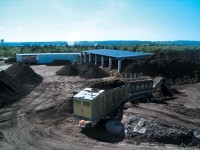Composting across Canada - UPDATE
Information provided by the Composting Council of Canada

Nova Scotia’s East River facility receives awardThe East River Mill in Chester, Nova Scotia recently received the Environmental Business of the Year Award from the Resource Recovery Fund Board (RRFB) for its on-site composting operation. Owned by Louisiana Pacific Corporation, the mill turns hardwood logs into hardboard siding and interior wood products, which are sold in Canada and internationally. The wood sludge fibre from the mill is the main feedstock for the on-site composting operation with more than 47,000 tonnes of or-ganics being processed annually.
The operations involve an in-vessel process for initial high temperature phase composting followed by outdoor maturing. Certified by the Composting Council of Canada’s Compost Quality Alliance program, the finished compost, available in both bulk and bagged formats, is primarily blended into a manufactured topsoil for landscaping and horticultural applications.
The composting operations and finished compost marketing efforts for the East River Mill are managed by Envirem Technologies Inc., an Atlantic Canada-based environmental company who also operates seven composting facilities in New Brunswick, sourcing municipal and IC&I-generated organic feedstocks such as livestock manures, fisheries and aquaculture residuals, agriculture, food processing sludge and municipal biosolids for its operations and compost production.
The operations involve an in-vessel process for initial high temperature phase composting followed by outdoor maturing. Certified by the Composting Council of Canada’s Compost Quality Alliance program, the finished compost, available in both bulk and bagged formats, is primarily blended into a manufactured topsoil for landscaping and horticultural applications.
The composting operations and finished compost marketing efforts for the East River Mill are managed by Envirem Technologies Inc., an Atlantic Canada-based environmental company who also operates seven composting facilities in New Brunswick, sourcing municipal and IC&I-generated organic feedstocks such as livestock manures, fisheries and aquaculture residuals, agriculture, food processing sludge and municipal biosolids for its operations and compost production.

